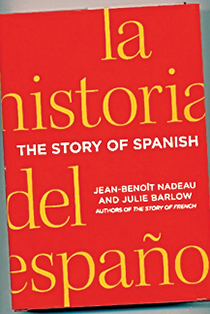Book review: La Historia del Español: The Story of Spanish
By Jean-Benoît Nadeau and Julie Barlow
Share
 Despite becoming a world-spanning language, and the means of cultural expression for tango, flamenco and Gabriel García Márquez, Spanish has always had more speakers than admirers. Even in its Iberian homeland, the locals for centuries thought their quirky version of late Latin was too uncouth for serious purposes—one 13th-century Castilian king had to force his bureaucracy to draft charters in its native tongue rather than in the more prestigious Arabic. But the language—known as Spanish to most of us but, as often as not, as Castilian within Spain, where Catalans and Basques dispute its right to take the national name—now approaches a new prominence, according to Canadian husband-and-wife team Nadeau and Barlow. The reason: its growing clout in the U.S., where the Hispanic population is winning second-language students by its burgeoning numbers and the appeal of its pop culture.
Despite becoming a world-spanning language, and the means of cultural expression for tango, flamenco and Gabriel García Márquez, Spanish has always had more speakers than admirers. Even in its Iberian homeland, the locals for centuries thought their quirky version of late Latin was too uncouth for serious purposes—one 13th-century Castilian king had to force his bureaucracy to draft charters in its native tongue rather than in the more prestigious Arabic. But the language—known as Spanish to most of us but, as often as not, as Castilian within Spain, where Catalans and Basques dispute its right to take the national name—now approaches a new prominence, according to Canadian husband-and-wife team Nadeau and Barlow. The reason: its growing clout in the U.S., where the Hispanic population is winning second-language students by its burgeoning numbers and the appeal of its pop culture.
A good moment, the authors reckon, to profile a language with an astonishing array of historical layers, something they illustrate by the origin of its name. Phoenicians were the first to leave written records about a land where one prolific creature fascinated them. I-shepan-ha, later run through Latin to become Hispania and Greek to become Spania, means “land of rabbits” in Phoenician. And everyone who later rampaged through a much-invaded peninsula also left a linguistic mark. A millennium ago, when a northern fringe of Christian kingdoms faced an imposing Islamic state to the south, a variety of what linguists call Iberio-Romance tongues were spoken. The variant in Castile was one of the oddest. The influence of Arabic and neighbouring Basque is strong: Basque has no letter f, and dozens of Latin-origin words that still begin with f in other Romance languages begin with h in Spanish. More subtly, border Castile was home to all kinds of Christian refugees from the Arab realm, resulting in a simplified common Romance language that remains Europe’s most phonetic.
Visit the Maclean’s Bookmarked blog for news and reviews on all things literary